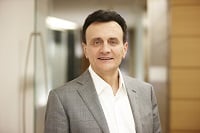In an interview with Reuters yesterday, CEO Pascal Soriot warned that turning around AstraZeneca is going to require a lengthy rebuilding effort.
"You've got to look at this over a horizon of three to four years, it is not a 6-month horizon," Soriot told the veteran pharma reporter Ben Hirschler. "And it is not going to be a smooth journey. We will have ups and downs."
For now, though, the journey continues to be primarily downhill.
Just days after the pharma giant ($AZN) decided to jettison the failed rheumatoid arthritis drug fostamatinib, the company is facing yet another setback. The diabetes drug Onglyza--which is partnered with Bristol-Myers Squibb ($BMY)--failed to prove any better than a placebo or standard therapy in reducing cardiovascular risks. While projections on what a success would be worth varied widely, some analysts wrote off a shot at adding about a billion dollars a year in sales. But more than anything, the trial failure underscored the dysfunctional track record in AstraZeneca's R&D division.
 |
| AZ CEO Pascal Soriot |
"With Crestor market exclusivity coming to an end in many territories (coming to a crescendo in 2016 with the US), the company needs to start delivering in its pipeline," chided Panmure Gordon analyst Savvas Neophytou, according to a report in The Guardian. "A number of assets have been rushed through to pivotal trials and this may spring up nice surprises but risk remains high in our view. Valuation is undemanding so some investors will find this an attractive turn-around story."
Coming on top of a string of clinical failures over recent years, the latest flop was another example of AstraZeneca's consistent inability to deliver new products or build on existing franchises. AstraZeneca has added a couple of late-stage products to the mix recently, bolting on Pearl Therapeutics and its COPD pipeline as well as Omthera's omega-3 cardio program. And the company has engaged in a whirlwind of early-stage and preclinical deals, emphasizing the incremental nature of the turnaround plan.
In the meantime, Soriot says that the company will start moving its scientists into temporary digs in Cambridge, getting a jump on plans to work more closely with investigators in the field as they build a new global headquarters at a local biotech campus. And he promised to continue to rebuild the late-stage pipeline--now under the direction of Briggs Morrison--through more deals and the acceleration of key Phase II drugs.
"You will see by the end of the year or early next year that our late-stage pipeline will look very different as a result of some of those acquisitions, but also with the acceleration of some of our Phase II projects that are moving into Phase III right now," he tells Reuters.
Soriot will find it very hard to convince analysts of much of anything, though, without solid pivotal data on novel first-line therapies to prove that the company is on the right track.
- here's the press release
- get the Reuters story
- read The Guardian's piece
Special Report: AstraZeneca/Bristol-Myers Squibb - Top diabetes drug pipelines of 2012